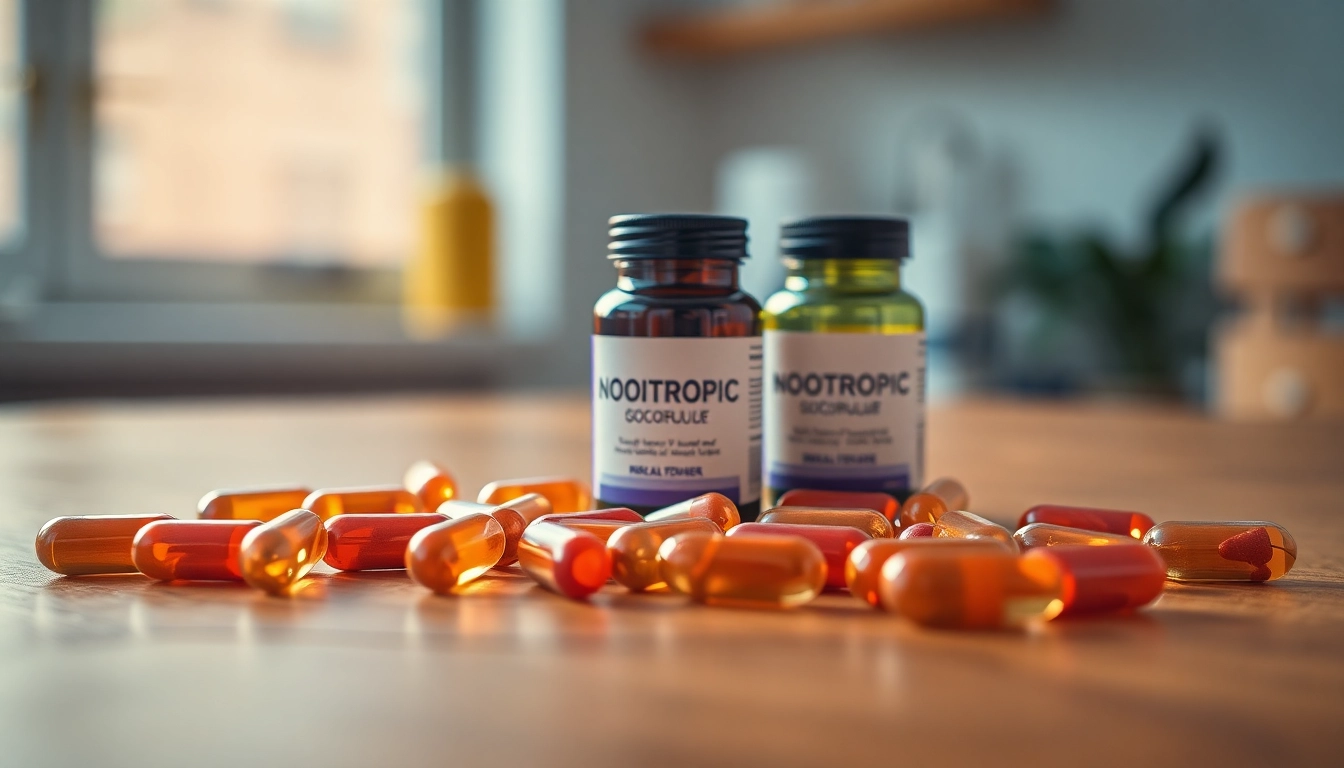
In the ever-evolving realm of cognitive enhancement, Nootropics have gained significant attention for their potential to improve mental performance, focus, and overall brain health. As people seek effective ways to boost their cognitive functions amid the demands of modern life, understanding nootropics is essential. This comprehensive guide explores the definition, benefits, types of nootropics, selection criteria, safety considerations, and methods for measuring their effectiveness. Whether you are a student looking to enhance your study techniques or a busy professional aiming to increase productivity, this article will provide valuable insights into the world of nootropics.
Understanding Nootropics: Definition and Benefits
What Are Nootropics?
Nootropics, often referred to as “smart drugs” or cognitive enhancers, are substances that can potentially improve cognition, memory, creativity, and motivation in healthy individuals. The term was first coined in 1972 by Romanian psychologist and chemist Corneliu E. Giurgea, who defined nootropics as compounds that enhance learning and memory while providing neuroprotective effects. Nootropics can be found in both natural and synthetic forms, and they have varying mechanisms of action, which influence their effectiveness and safety profiles.
The Science Behind Cognitive Enhancers
The science of nootropics is rooted in neuroscience, pharmacology, and psychology. Many nootropics work by altering the brain’s neurotransmitter levels, enhancing neuronal communication, and increasing blood flow to the brain. Some common brain chemicals affected include dopamine, serotonin, and acetylcholine, which play critical roles in mood regulation, attention, and memory formation. Additionally, nootropics can promote neuroplasticity, the brain’s ability to reorganize and form new neural connections, thereby enhancing cognitive flexibility and learning capacity.
Key Benefits of Using Nootropics for Mental Clarity
Individuals turn to nootropics for various reasons tied to improving mental performance. The key benefits include:
- Enhanced Focus: Many nootropics increase attention span and concentration, making it easier to complete complex tasks or study for extended periods.
- Improved Memory: Certain compounds are known to boost memory retention and recall, aiding both in learning processes and test performance.
- Heightened Creativity: Some users report that nootropics can unlock creative thinking by fostering a more flexible approach to problem-solving.
- Increased Motivation: Nootropics can enhance motivation levels, making mundane tasks feel more engaging and helping to combat procrastination.
- Reduced Anxiety: Certain nootropics may help alleviate anxiety symptoms, thereby allowing individuals to perform better under pressure.
Types of Nootropics: Natural vs. Synthetic
Popular Natural Nootropics and Their Effects
Natural nootropics are derived from plants or herbs and are often used for their broad health benefits alongside cognitive enhancement. Some commonly used natural nootropics include:
- Rhodiola Rosea: Known for its adaptogenic properties, Rhodiola helps reduce fatigue and improve attention during stressful situations.
- Ginkgo Biloba: Frequently used for memory enhancement, Ginkgo may improve cognitive function by increasing blood flow to the brain.
- Bacopa Monnieri: This herb has been shown to boost memory and cognitive function, especially with long-term use.
- Panax Ginseng: Known for its ability to enhance overall cognitive performance, Panax ginseng can help improve energy levels and mental clarity.
Understanding Synthetic Nootropics: Risks and Rewards
Synthetic nootropics are man-made compounds designed to enhance cognitive function. Examples include compounds like Modafinil, Piracetam, and Aniracetam. These substances often target specific neurological pathways and are sometimes prescribed for conditions like narcolepsy or ADHD. While they can offer potent benefits, there are also risks involved, including:
- Dependency: Some synthetic nootropics may lead to tolerance or dependency if used excessively.
- Side Effects: Users may experience adverse effects, including headaches, insomnia, and digestive issues.
- Legality and Accessibility: Certain synthetic nootropics can be restricted or controlled substances in various countries.
Comparative Analysis of Natural and Synthetic Options
The choice between natural and synthetic nootropics often depends on individual goals, health status, and personal preferences. Natural nootropics tend to have a more gradual effect, improving cognitive function over time and offering additional health benefits. In contrast, synthetic nootropics can provide immediate results but may carry higher risks. Users should conduct thorough research and consider personal tolerance levels before opting for either option.
How to Choose the Right Nootropics for Your Needs
Assessing Your Cognitive Goals
Before selecting a nootropic, it is crucial to assess your cognitive goals and what you hope to achieve. Are you looking to enhance memory for an upcoming exam, improve focus for work-related tasks, or increase creativity for a project? Identifying specific goals will help narrow down suitable nootropic options that align with your needs.
Consulting Professionals: When to Seek Advice
It’s advisable to consult with a healthcare professional before starting any nootropic regimen, especially if you have pre-existing conditions or concerns. A professional can provide personalized advice, help assess potential risks, and ensure that the chosen nootropics won’t interfere with any medications or treatments you are currently undergoing.
Tips for Selecting Quality Nootropic Products
When choosing nootropic products, consider the following tips:
- Research Brands: Look for reputable companies that provide third-party testing and transparent ingredient sourcing.
- Read Reviews: Examine user testimonials and expert reviews to gauge the effectiveness and reliability of the product.
- Examine Ingredients: Ensure that the product contains active ingredients known for their cognitive enhancement properties and that there are no unnecessary fillers.
- Check Dosage Guidelines: Follow the recommended dosages to minimize the risk of side effects and maximize benefits.
Potential Side Effects and Safety Considerations
Common Side Effects of Nootropics
While nootropics can offer cognitive benefits, they are not without risks. Common side effects can vary based on the specific nootropic used but may include:
- Insomnia or trouble sleeping
- Increased anxiety or restlessness
- Digestive issues such as nausea
- Headaches or migraines
- Fatigue or sudden energy crashes
Safety Tips for Responsible Use of Brain Boosters
To minimize risks associated with nootropic use, consider the following safety tips:
- Start Low and Go Slow: Begin with the lowest effective dose to assess tolerance and effects.
- Take Breaks: Consider cycling on and off nootropics to prevent tolerance and dependency.
- Stay Informed: Continue researching and staying updated on any new findings related to the nootropic you are using.
- Listen to Your Body: Pay attention to how you feel while using nootropics and discontinue use if you experience adverse effects.
Understanding Individual Reactions to Nootropics
Individual responses to nootropics can vary significantly due to factors such as genetics, lifestyle, and existing health conditions. What works for one person may not work for another. Tracking your reactions and adapting your usage accordingly is key to finding a nootropic that enhances your cognition without negative side effects.
Measuring Effectiveness: Tracking Your Progress with Nootropics
Setting Baselines for Cognitive Performance
To measure the effectiveness of nootropics accurately, it is vital to establish baselines for your cognitive performance before starting any new product. This can be done through simple self-assessment quizzes, memory tests, or cognitive function tests available online. By keeping track of your scores over time, you can better evaluate the impact of the nootropic on your cognitive abilities.
Journaling Your Experience and Observations
Maintaining a journal is an effective way to track your experiences while using nootropics. Document your daily mood, energy levels, cognitive performance, and any side effects you may encounter. This record can provide insights into which nootropics are delivering the best results for you and assist in making adjustments as needed.
Reviewing Scientific Research on Nootropics
Regularly reviewing scientific literature on nootropics can provide up-to-date insights into their efficacy, safety, and new discoveries. Look for peer-reviewed studies that evaluate various components of nootropics and their effects on cognitive function. This research can help refine your choices and ensure that you are using the most effective and safe options available.








